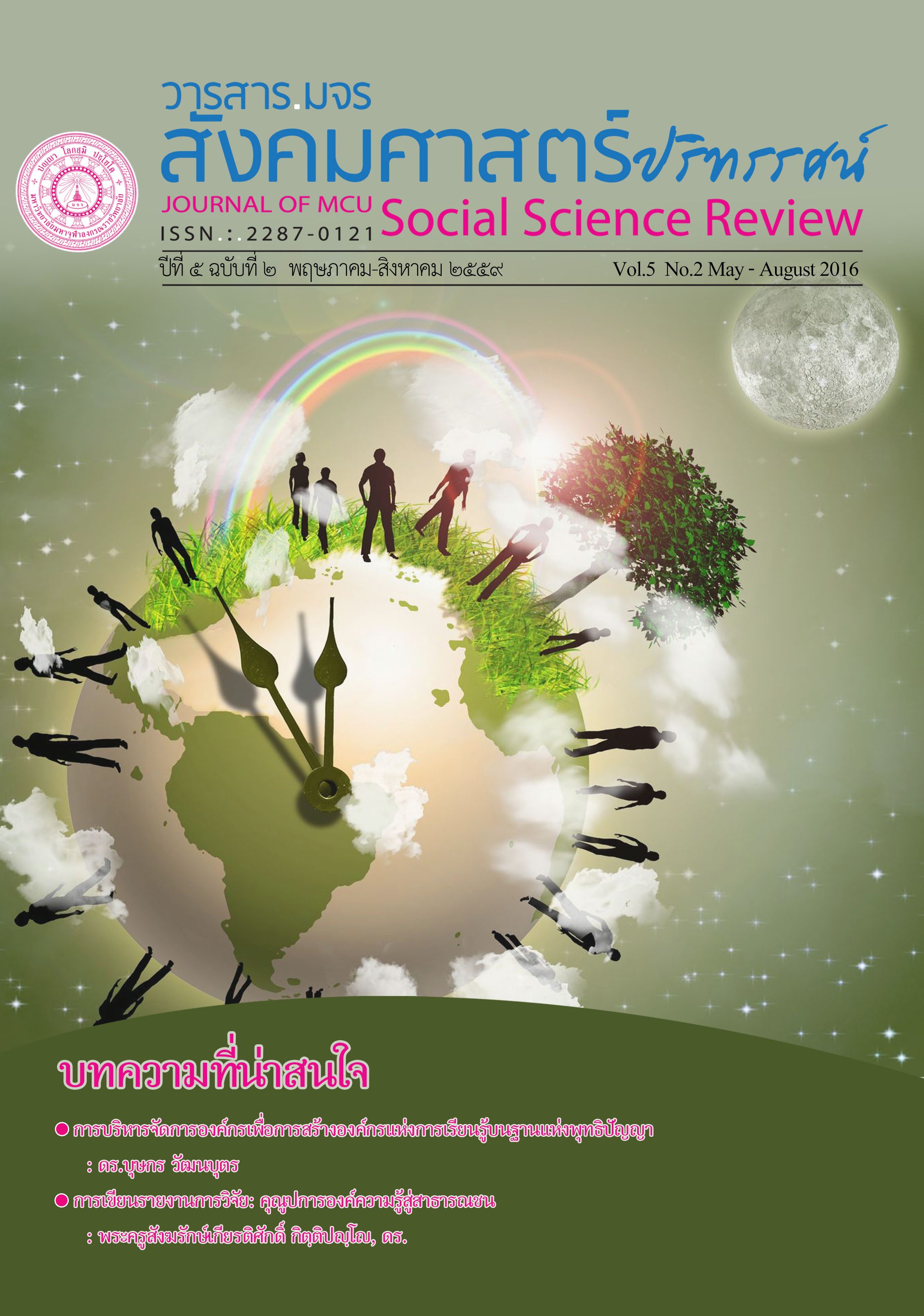พุทธวิธีการจัดการความรู้สู่การพัฒนาวิทยาลัยสงฆ์ในเขตภาคเหนือตอนบน
คำสำคัญ:
พุทธวิธีการจัดการความรู้, การพัฒนาวิทยาลัยสงฆ์, ภาคเหนือตอนบนบทคัดย่อ
บทความวิจัยครั้งนี้มีวัตถุประสงค์ ๓ คือ ๑) เพื่อศึกษาสภาพทั่วไปของการจัดการความรู้ของวิทยาลัยสงฆ์ในขตภาคเหนือตอนบน ๒) เพื่อศึกษาปัญหาอุปสรรค ในการจัดการความรู้ของวิทยาลัยสงฆ์ในเขตภาคเหนือตอนบน ๓) เพื่อนำเสนอรูปแบบพุทธวิธีการจัดการความรู้เชิงบูรณาการสู่การพัฒนาวิทยาลัยสฆ์ในเขตภาคเหนืตอนบน การศึกษาวิจัยครั้งนี้ใช้วิธีวิจัยแบบผสมผสาน(Mixed Methodology) ทั้งการวิจัยเชิงปริมาณ (Quantitative Research) และเชิงคุณภาพ(Qualitative Research)ในชิงปริมาณก็บข้อลจากกลุ่มตัวอย่าง ผู้บริหาร และเจ้าหน้าที่ วิทยาลัยสงฆ์ในเขตภาคเหนือตอนบน จำนวน ๖๘ รูป/คน แบบสอบถามเป็นเครื่องมือและนำมาวิเคราะห์ข้อมูลด้วยสถิติพรรณนา ได้แก่คร้อยละ (Frequency) คำเฉลี่ย (Mean) และค่าเบี่ยงเบนมาตรฐาน(StandardDeviations) ส่วนเชิงคุณภาพ เก็บข้อมูลด้วยการสัมภาษณ์เชิงลึก (In-Depth-Interview) จากผู้ให้ข้อมูลสำคัญ (Key Informants) จำนวน ๒๐ รูป/คน ซึ่งเป็นผู้อำนวยการ รองผู้อำนวยการ หัวหน้าฝ่าย หัวหน้าสาขา จากวิทยาลัยสงฆ์ในเขตภาคเหนือตอนบน ๔ แห่ง และนำมาวิเคราะห์ข้อมูลด้วยวิธีอุปนัย และการพรรณนาความผลการศึกษาวิจัยพบว่าสภาพการจัดการความรู้ของวิทยาลัยสงฆ์ในเขตภาคเหนือตอนบน เป็นการจัดการความรู้ในลักษณะของการบริหา และเชิงการเรียนรู้ ด้านพัฒนาคน พบว่าการจัดการความรู้ในองค์การจำเป็นอย่างยิ่งในการปรับเปลี่ยนตำแหน่งเพื่อเรียนรู้งานต่างสายงาน ส่วนด้านพัฒนางานพบว่ามีการประชุมเพื่อสร้างการเรียนรู้ร่วมกัน และทำงานเป็นทีม ในด้านพัฒนาองค์กร พบว่าหน่วยงานระเบีย และข้อบัคับ ของการบริหารราชการ โดยภาพรวม การจัดการความรู้ของวิทยาลัยสงฆ์ในเขตภาคเหนือตอนบน หน่วยงานมีการสื่อสารให้บุคลากรรับทราบถึงวิสัยทัศน์ และความมุ่งมั่นขององค์กรพุทธวิธีการจัดการความรู้สำหรับการพัฒนาวิทยาลัยสงฆ์ในเขตภาคเหนือตอนบน พบว่ามีการจัดการความรู้โดยการนำหล้กอปริหานิยธรรม ๗ มาบูรณาการการจัดการความรู้ในองค์กร เพื่อนำไปสู่การพัฒนาคน พัฒนางาน และพัฒนาองค์กร ให้เป็นองค์กรแห่งการเรียนรู้ เช่นมีการหมั่นประชุมกันเนืองนิตย์ พร้อมเพียงกันประชุม พร้อมเพียงกันเลิกประชุม เป็นต้น ในขณะเดียวกันการจัดการความรู้ที่เกี่ยวข้องกับองค์การจะคำนึงถึงหลักคุณธรรมและจริยธรรมในการพัฒนางานองค์การ เพื่อให้มีประสิทธิภาพ ประสิทธิผล ต่อการพัฒนางาน พัฒนาคน แล ะพัฒนาองค์กรอย่างยั่งยืนมั่นคงพุทธวิธีการจัดการความรู้ สำหรับการพัฒนาวิทยาลัยสงฆ์ในเขตภาคเหนือตอนบนพบว่าควรมีกรบูรณาการนำหลักธรรมอปริหานิยธรรม ๗ เป็นแนวทางในการบริหารจัดการความรู้และควรมีการว่าแผนเกี่ยวกับการบริหารจัดการความรู้ด้วยการกำหนดแผนกลยุทธ์อย่างมีมาตรฐาน มีการสร้างกิจกรมเพื่อการแลกเปลี่ยนเรียนรู้มีกาสร้างคลังความรู้ ในการจัดระบบอย่างเป็นหมวดหเพื่อให้สมารถข้าถึได้ง่ยอย่างเป็นรูปธรรมการประเมินผลการปฏิบัติงานด้านการจัดการความรู้ ทั้งนี้เพื่อให้บรรลุเป้หมาย ๓ ประการ ได้แก่การพัฒนางาน พัฒนาคน และการพัฒนาองค์ก ไปสู่การเป็นองค์กรแห่งการเรียนรู้อย่างต่อเนื่อง
เอกสารอ้างอิง
บุญส่ง หาญพานิช. "การพัฒนารูปแบบการบริหารจัดการความรู้ในสถาบันอุดมศึกษาไทย". คร
ศาสตร์ดุษฎีบัณฑิต. บัณฑิตวิทยาลัย : จุฬาลงกรณ์มหาวิทยาลัย, ๒๕๔๖.
เอื้อมพร ชลวร. "การจัดการความรู้เชิงพุทธบูรณาการ ". วิทยานิพนธ์พุทธศาสตรดุษฎีบัณฑิต.
บัณฑิตวิทยาลัย : มหาวิทยาลัยมหาจุฬาลงกรณราชวิทยาลัย, ๒๕๕๔.
(๒) สัมภาษณ์ :
สัมภาษณ์ นายประวิทย์ เอกเจริญสุข, วิทยาลัยสงฆ์นครเชียงราย, ๑๐ กันยายน ๒๕ ๕๗.
สัมภาษณ์ พระปลัดเทียน พลวุทโฒผู้, อำนวยการสำนักงานวิชาการ วิทยาลัยสงฆ์นครน่าน, ๑๕
กันยายน ๒๕๕๗.
สัมภาษณ์ พระปลัดวัชรพงษ์ วิชิปญโญ หัวหน้าฝ้ายวางแผนวิชาการ, วิทยาลัยสงฆ์นครน่าน, ๑๕
กันยายน ๒๕๕๗.
สัมภาษณ์ นายจีรศักดิ์ ปันลำ รก.หัวหนสาขาวิชาการสอนพระพุทธศาสนาและจิตวิทยาการแนะ
แนว, วิทยาลัยสงฆ์นครลำปาง, ๘ กันยายน ๒๕๕๗.
สัมภาษณ์ นายไพรินทร์ ณ วันนา รองผู้อำนวยการ, วิทยาลัยสงฆ์ลำพูน, ๒๐ กันยายน ๒๕๕๗.
สัมภาษณ์ พระมหาผดุงศักดิ์ เสสปุญโญ หัวหน้าสาขาวิชารัฐศาสตร์ วิทยาลัยสงฆ์นครเชียงราย,
๑๐ กันยายน ๒๕๕๗.
สัมภาษณ์ นายเสน่ห์ ใจสิทธิ์ หัวหนสาขาวิชารัฐศาสตร์วิทยาลัยสงฆ์ลำพูน, ๒๐ กันยายน ๒๕๕๗.
สัมภาษณ์พระครูสุตชยาภรณ์ รก.หัวหนสาขาวิชาพระพุทธศาสนา วิทยาลัยสงฆ์นครลำปาง, ๒O
กันยายน ๒๕๕๗.
สัมภาษณ์ พระสมุห์อุทัย อุทยมสี รก.หัวหน้าสาขาวิชารัฐประศาสนศาสตร์ วิทยาลัยสงฆ์นครน่าน
, ๑๕ กันยายน ๒๕๕๗.
ดาวน์โหลด
เผยแพร่แล้ว
รูปแบบการอ้างอิง
ฉบับ
ประเภทบทความ
สัญญาอนุญาต
ลิขสิทธิ์ (c) 2016 วารสาร มจร สังคมศาสตร์ปริทรรศน์

อนุญาตภายใต้เงื่อนไข Creative Commons Attribution-NonCommercial-NoDerivatives 4.0 International License.
เพื่อให้เป็นไปตามกฎหมายลิขสิทธิ์ ผู้นิพนธ์ทุกท่านต้องลงลายมือชื่อในแบบฟอร์มใบมอบลิขสิทธิ์บทความให้แก่วารสารฯ พร้อมกับบทความต้นฉบับที่ได้แก้ไขครั้งสุดท้าย นอกจากนี้ ผู้นิพนธ์ทุกท่านต้องยืนยันว่าบทความต้นฉบับที่ส่งมาตีพิมพ์นั้น ได้ส่งมาตีพิมพ์เฉพาะในวารสาร มจร สังคมศาสตร์ปริทรรศน์ เพียงแห่งเดียวเท่านั้น หากมีการใช้ภาพหรือตารางหรือเนื้อหาอื่นๆ ของผู้นิพนธ์อื่นที่ปรากฏในสิ่งตีพิมพ์อื่นมาแล้ว ผู้นิพนธ์ต้องขออนุญาตเจ้าของลิขสิทธิ์ก่อน พร้อมทั้งแสดงหนังสือที่ได้รับการยินยอมต่อบรรณาธิการ ก่อนที่บทความจะได้รับการตีพิมพ์ หากไม่เป็นไปตามข้อกำหนดเบื้องต้น ทางวารสารจะถอดบทความของท่านออกโดยไม่มีข้อยกเว้นใดๆ ทั้งสิ้น





